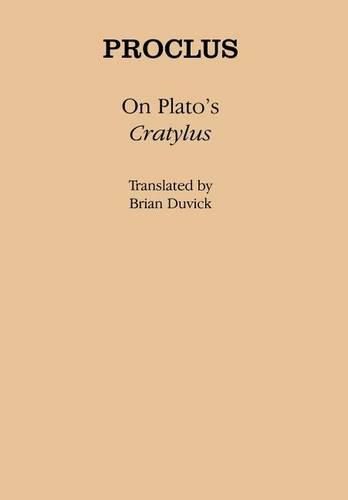Readings Newsletter
Become a Readings Member to make your shopping experience even easier.
Sign in or sign up for free!
You’re not far away from qualifying for FREE standard shipping within Australia
You’ve qualified for FREE standard shipping within Australia
The cart is loading…






Proclus’ commentary on Plato’s Cratylus is the only ancient commentary on this work to have come down to us, and is illuminating in two special ways. First, it is actually the work of two Neoplatonists. The majority of the material is supplied by the Athenian-based Proclus (c. 411-485 AD), who is well known for his magisterial commentaries on Plato’s Timaeus and Parmenides, as well as for a host of other works involving the study of Plato. This material we have consists of excerpts from Proclus’ commentary edited by another figure who appears to be a Platonist working somewhat later in Alexandria. Consequently it contains insights into the philosophy of both of the principal late antique centers of Platonism, Athens and Alexandria. Secondly, the material is divided between the grittier issues of language-theory, on which it engages freely with other ancient philosophies, and theological discussion mostly involved with the etymologies of the names of Greek gods, in which Proclus is more concerned to relate his own brand of Platonism to the ‘Orphic’ and ‘Chaldaean’ theological systems, and also to Homer. Brian Duvick’s extensive notes bring out all these facets of the ancient text.
$9.00 standard shipping within Australia
FREE standard shipping within Australia for orders over $100.00
Express & International shipping calculated at checkout
Proclus’ commentary on Plato’s Cratylus is the only ancient commentary on this work to have come down to us, and is illuminating in two special ways. First, it is actually the work of two Neoplatonists. The majority of the material is supplied by the Athenian-based Proclus (c. 411-485 AD), who is well known for his magisterial commentaries on Plato’s Timaeus and Parmenides, as well as for a host of other works involving the study of Plato. This material we have consists of excerpts from Proclus’ commentary edited by another figure who appears to be a Platonist working somewhat later in Alexandria. Consequently it contains insights into the philosophy of both of the principal late antique centers of Platonism, Athens and Alexandria. Secondly, the material is divided between the grittier issues of language-theory, on which it engages freely with other ancient philosophies, and theological discussion mostly involved with the etymologies of the names of Greek gods, in which Proclus is more concerned to relate his own brand of Platonism to the ‘Orphic’ and ‘Chaldaean’ theological systems, and also to Homer. Brian Duvick’s extensive notes bring out all these facets of the ancient text.